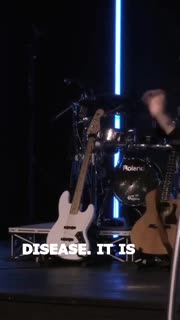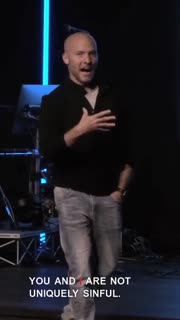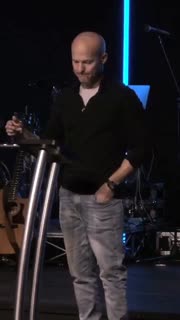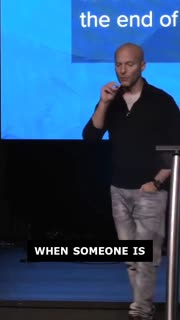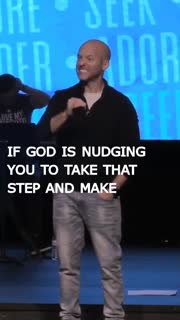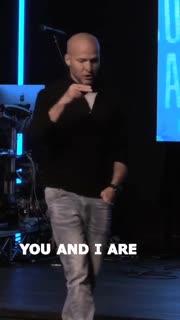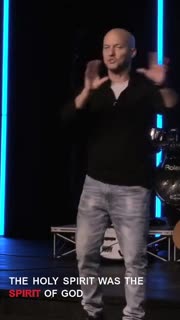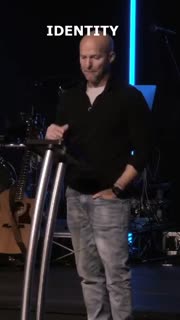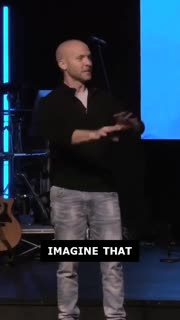Confronting Sin: The Call to Repentance and Baptism
Summary
### Summary
In today's sermon, we explored the concept of sin and its pervasive impact on our lives, often blinding us to our own transgressions. We began with relatable anecdotes about unknowingly breaking traffic laws, drawing a parallel to how sin operates in our lives. Sin is a spiritual disease that can desensitize our conscience, making us unaware of our moral failings. This was the situation Peter addressed in his first sermon after Pentecost, where he confronted the Jewish nation for their role in the crucifixion of Jesus, the Messiah they had long awaited.
Peter's message was clear: despite their ignorance, their actions had severe consequences. He emphasized that Jesus, whom they crucified, was both Lord and Christ, sent to bring salvation not just to Israel but to all nations. This message pierced the hearts of his listeners, leading them to ask, "What should we do?" Peter's response was to repent and be baptized in the name of Jesus Christ for the forgiveness of sins and the gift of the Holy Spirit.
Baptism was highlighted as a significant act of repentance and public declaration of faith. It symbolizes a change in identity, access to God, allegiance, and life’s aim. Baptism is not just a ritual but an announcement of turning to God, admitting sin, and believing in His promise of eternal forgiveness and friendship. It signifies dying to the old self and rising to a new life in Christ, filled with the Holy Spirit.
The sermon concluded with an invitation to those who have not yet put their faith in Jesus to do so, emphasizing the simplicity of acknowledging, believing, and confessing Jesus as Lord. The promise of salvation and the gift of the Holy Spirit are available to all who respond to God's call.
### Key Takeaways
1. The Blinding Nature of Sin: Sin is a spiritual disease that can desensitize our conscience, making us unaware of our moral failings. Just as we might unknowingly break a traffic law, we can be sinning without realizing it due to the corrupting influence of sin on our moral compass. This underscores the need for divine revelation and repentance. [02:16]
2. The Universality of Sin and Salvation: Peter's sermon at Pentecost highlighted that all of humanity is responsible for Jesus' crucifixion due to our collective sin. This realization should lead us to repentance and acceptance of Jesus' sacrifice, which offers salvation to all, regardless of our background or past actions. [06:05]
3. The Significance of Baptism: Baptism is more than a ritual; it is a public declaration of faith, repentance, and a commitment to follow Jesus. It symbolizes dying to our old selves and rising to a new life in Christ, filled with the Holy Spirit. This act of obedience and humility is crucial in our spiritual journey. [09:39]
4. Transformation Through the Holy Spirit: Accepting Jesus and being baptized brings a profound transformation. Our identity changes as we become children of God, our access to God is enhanced through the Holy Spirit, and our allegiance shifts to Christ and His mission. This transformation empowers us to live a life that reflects God's love and purpose. [18:28]
5. The Call to Make Disciples: Jesus' final command to His disciples was to make disciples of all nations, baptizing them and teaching them to obey His commands. This mission continues today, and every believer is called to participate in spreading the gospel and helping others come to faith in Jesus. [23:18]
### YouTube Chapters
[0:00] - Welcome
[00:34] - Unseen Violations
[01:10] - Missed Responsibilities
[02:16] - The Blinding Nature of Sin
[03:29] - Peter's Convicting Sermon
[04:48] - The Irony of Missing the Messiah
[05:28] - Theological Implications of Sin
[06:38] - Personal and Universal Sinfulness
[07:43] - The Call to Repentance
[08:37] - The Promise of the Holy Spirit
[09:39] - The Significance of Baptism
[10:40] - The Call to Be Saved
[11:43] - Embracing Baptism
[12:24] - Announcing Faith Through Baptism
[13:01] - The Cure for Sin
[14:48] - Identity Changes Through Baptism
[16:45] - Access to God Through the Holy Spirit
[18:28] - The Refreshing of the Holy Spirit
[20:03] - The Promise of the Holy Spirit
[21:29] - Unity in the Body of Christ
[23:18] - The Call to Make Disciples
[24:23] - Completing the Baptismal Journey
[25:36] - Invitation to Baptism
[26:46] - Responding to God's Call
[27:22] - Prayer for Salvation
[28:41] - Baptism Ceremony
Study Guide
### Bible Reading
1. Acts 2:36-38: "Therefore let all the house of Israel know assuredly that God has made this Jesus, whom you crucified, both Lord and Christ. Now when they heard this, they were cut to the heart, and said to Peter and the rest of the apostles, 'Men and brethren, what shall we do?' Then Peter said to them, 'Repent, and let every one of you be baptized in the name of Jesus Christ for the remission of sins; and you shall receive the gift of the Holy Spirit.'"
### Observation Questions
1. What was Peter's main message to the Jewish nation in his sermon at Pentecost? ([04:07])
2. How did the people respond when they realized their role in the crucifixion of Jesus? ([07:43])
3. What are the two promises Peter mentions that come with repentance and baptism? ([08:37])
4. What does baptism symbolize according to the sermon? ([12:24])
### Interpretation Questions
1. Why is sin described as a "spiritual disease" that can desensitize our conscience? How does this affect our awareness of moral failings? ([02:16])
2. How does Peter's sermon at Pentecost illustrate the universality of sin and the need for salvation? ([06:05])
3. What is the significance of baptism in the context of a Jewish honor and shame culture, and how does it apply to us today? ([09:39])
4. How does the Holy Spirit transform a believer's identity, access to God, and allegiance according to the sermon? ([18:28])
### Application Questions
1. Reflect on a time when you were unaware of a wrongdoing until it was pointed out to you. How did you respond, and what did you learn from that experience? ([00:34])
2. Peter's sermon led his listeners to ask, "What should we do?" Have you ever felt convicted by a message or a situation to the point of asking a similar question? How did you respond? ([07:43])
3. Baptism is described as a public declaration of faith and repentance. If you have been baptized, how did it impact your spiritual journey? If not, what might be holding you back from taking this step? ([12:24])
4. The sermon emphasizes the transformation brought by the Holy Spirit. Can you identify a specific area in your life where you have experienced this transformation? How has it changed your actions or perspective? ([18:28])
5. Jesus' final command was to make disciples of all nations. How are you currently participating in this mission? What steps can you take to be more active in spreading the gospel? ([23:18])
6. The sermon mentions the importance of acknowledging, believing, and confessing Jesus as Lord. Have you had opportunities to share your faith with others? How did you approach it, and what was the outcome? ([13:31])
7. Reflect on the concept of sin as a personal offense against God. How does this understanding affect your view of repentance and your relationship with God? ([07:13])
Devotional
Day 1: The Blinding Nature of Sin
Sin is a spiritual disease that can desensitize our conscience, making us unaware of our moral failings. Just as we might unknowingly break a traffic law, we can be sinning without realizing it due to the corrupting influence of sin on our moral compass. This underscores the need for divine revelation and repentance. Sin's blinding nature can lead us to live in ignorance of our wrongdoings, which is why it is crucial to seek God's guidance and allow His light to reveal our hidden faults.
Peter's sermon at Pentecost serves as a powerful reminder of this truth. He confronted the Jewish nation for their role in the crucifixion of Jesus, highlighting that their actions, though done in ignorance, had severe consequences. This confrontation led to a piercing realization among the listeners, prompting them to ask, "What should we do?" Peter's response was clear: repent and be baptized for the forgiveness of sins and the gift of the Holy Spirit. This call to repentance is a call to awaken from the blindness of sin and turn towards God's truth. [02:16]
Ephesians 4:18-19 (ESV): "They are darkened in their understanding, alienated from the life of God because of the ignorance that is in them, due to their hardness of heart. They have become callous and have given themselves up to sensuality, greedy to practice every kind of impurity."
Reflection: Think of a time when you realized you were wrong about something important. How did you come to that realization, and what steps did you take to correct it? How can you apply this process to your spiritual life today?
Day 2: The Universality of Sin and Salvation
Peter's sermon at Pentecost highlighted that all of humanity is responsible for Jesus' crucifixion due to our collective sin. This realization should lead us to repentance and acceptance of Jesus' sacrifice, which offers salvation to all, regardless of our background or past actions. The universality of sin means that no one is exempt from its corrupting influence, but it also means that salvation through Jesus Christ is available to everyone.
This message is both humbling and hopeful. It reminds us that we are all in need of God's grace and that His offer of salvation is extended to all people. Peter's declaration that Jesus is both Lord and Christ emphasizes the significance of His sacrifice and the inclusivity of His salvation. This understanding should lead us to a posture of humility and gratitude, recognizing our need for repentance and the transformative power of Jesus' sacrifice. [06:05]
Romans 3:23-24 (ESV): "For all have sinned and fall short of the glory of God, and are justified by his grace as a gift, through the redemption that is in Christ Jesus."
Reflection: Reflect on the fact that Jesus' sacrifice was for all humanity, including you. How does this truth impact your view of yourself and others? How can you share this message of universal salvation with someone in your life today?
Day 3: The Significance of Baptism
Baptism is more than a ritual; it is a public declaration of faith, repentance, and a commitment to follow Jesus. It symbolizes dying to our old selves and rising to a new life in Christ, filled with the Holy Spirit. This act of obedience and humility is crucial in our spiritual journey. Baptism represents a profound transformation, marking a change in identity, access to God, allegiance, and life’s aim.
Through baptism, we announce our turning to God, admitting our sin, and believing in His promise of eternal forgiveness and friendship. It is a powerful symbol of our new life in Christ, where we are no longer defined by our past but by our relationship with Jesus. This public declaration serves as a testimony to others of our faith and commitment to follow Jesus, encouraging them to consider their own spiritual journey. [09:39]
Colossians 2:12 (ESV): "Having been buried with him in baptism, in which you were also raised with him through faith in the powerful working of God, who raised him from the dead."
Reflection: If you have been baptized, reflect on the significance of that moment in your life. How has your life changed since then? If you have not been baptized, what is holding you back from taking this step of faith?
Day 4: Transformation Through the Holy Spirit
Accepting Jesus and being baptized brings a profound transformation. Our identity changes as we become children of God, our access to God is enhanced through the Holy Spirit, and our allegiance shifts to Christ and His mission. This transformation empowers us to live a life that reflects God's love and purpose. The Holy Spirit plays a crucial role in this transformation, guiding us, convicting us of sin, and empowering us to live according to God's will.
This new identity in Christ means that we are no longer defined by our past mistakes or failures but by our relationship with God. The Holy Spirit's presence in our lives provides us with the strength and wisdom to navigate the challenges of life and to live in a way that honors God. This transformation is an ongoing process, as we continually seek to grow in our faith and deepen our relationship with God. [18:28]
2 Corinthians 5:17 (ESV): "Therefore, if anyone is in Christ, he is a new creation. The old has passed away; behold, the new has come."
Reflection: In what ways have you experienced the transformative power of the Holy Spirit in your life? How can you invite the Holy Spirit to work more deeply in a specific area of your life today?
Day 5: The Call to Make Disciples
Jesus' final command to His disciples was to make disciples of all nations, baptizing them and teaching them to obey His commands. This mission continues today, and every believer is called to participate in spreading the gospel and helping others come to faith in Jesus. The call to make disciples is a call to share the love and truth of Jesus with others, helping them to grow in their faith and become followers of Christ.
This mission is not limited to pastors or missionaries but is the responsibility of every believer. We are all called to be witnesses of Jesus' love and to share the message of salvation with those around us. This can be done through our words, actions, and the way we live our lives. By making disciples, we are participating in God's redemptive work in the world and helping to bring others into a relationship with Him. [23:18]
Matthew 28:19-20 (ESV): "Go therefore and make disciples of all nations, baptizing them in the name of the Father and of the Son and of the Holy Spirit, teaching them to observe all that I have commanded you. And behold, I am with you always, to the end of the age."
Reflection: Who in your life can you share the message of Jesus with today? How can you be intentional about making disciples in your daily interactions and relationships?
Quotes
### Quotes for outreach
1. "Sin, it's a disease. It is a spiritual disease. It's a moral disease. It's the hell disease. It's the death disease. And this disease is so bad that it blinds us to the fact that we even are sinning sometimes. It will tell us, no, that's not wrong, or you don't need to worry about that. We can get in situations where we're genuinely sinning. Now, we don't feel like we're sinning." [02:16] (22 seconds)
2. "You and I are not uniquely sinful. You're not like the especially bad one. For we've all sinned. We've all fallen short of the glory of God. We all stumble in many ways. No temptation has seized you, but what is common to man. So we're all equally sinful. None of us are uniquely sinful." [06:38] (25 seconds)
3. "Baptism is an act of announcing that you are turning to God, admitting your sin, and believing in his purpose. Personal, eternal forgiveness and friendship. Doggone, that sounds good. That sounds better than a bowl of Captain Crunch. Let's read it again. Baptism is an act of announcing. It's an act of announcing. When people get baptized here pretty soon, it's an announcement. It's an announcement that they are turning to God and admitting their sin and believing his promise of personal, eternal forgiveness and friendship." [12:24] (37 seconds)
4. "When someone is baptized, they receive that exact same charge. That was a charge to the disciples. I want you to go make disciples, and when you're making them, help them get baptized. Help them come into the family, help them to announce their salvation. But when they do, they're also receiving that charge. That's the same thing. So when you get baptized, now you have a higher ultimate aim. I want to do what I'm here to do on earth. I want to love my family. I want to achieve my goals. But there's also this higher sense of, and whatever else I do, I'm supposed to be contributing to making disciples, who will then get baptized, and make disciples, and then baptize others, and then baptize others, all the way down." [23:47] (35 seconds)
5. "If God is nudging you to take that step and make that announcement, I want to give you that opportunity. What's required? Just what, just what Peter said. Repent, each one of you, and be baptized for the forgiveness of sin. And you'll receive the gift of the Holy Spirit, this Jesus whom you crucified. The danger is, we might feel the Spirit of God piercing our heart like those original folks did, but we might resist it and push back against it and say, no, not me. Can I just encourage you to give in, follow in their footsteps and just give into it because the promise is for you and it's for your children and all who are far off, as many as the Lord will call to himself." [26:07] (48 seconds)
### Quotes for members
1. "This is a situation that Peter and his audience are in. Peter's preaching is really his first good sermon, okay? The day of Pentecost has just happened. This promised person of the Holy Spirit has just arrived. Peter gets full of that Holy Spirit of Jesus, stands up, and he begins to preach, and he begins to detail out to the people who are gathered around. This is the Jewish nation. He begins to let them know, hey, by the way, man, you guys really missed it. You put the guy you've been waiting for all this time, you just put him to death, and you either ignored it, or you participated with it, or you were one of the leaders, or you were afraid to stand up for him, or whatever." [03:29] (39 seconds)
2. "You and I are also personally sinful, meaning it was an interpersonal exchange between you and your God. He takes it seriously. It's a relationship he has with you even when you don't know you have it with him. When we break his law, when we say, God, to hell with you, I'll just do it. I'll just do it on my own. I should be boss. When we say that, now he's tough, but he takes it personally because he's like, everything I've ever done and everything I've ever said toward you was for you and for your good so you could be in the safest, most wonderful place, which is my arms." [07:13] (38 seconds)
3. "The Holy Spirit was the Spirit of God who filled the temple, who left. He left the Jewish nation when they'd betrayed him enough that he kicked them out of their own land and sent them into exile and his presence never came back to that temple. But it was prophesied, one day he would come back to a newer temple and do a better work and that temple would be the hearts of mankind. So he's saying that promise is for you. This God that abandoned us with his presence long ago, his promise is he'll come into you as the temple right now. Not just for in the temple, in you right now. You are the recipient of that promise. That's pretty dope." [09:03] (43 seconds)
4. "My identity changes. For you are all children of God through faith in Christ. We all might say, hey, we're all children of God. That's true in a sense, but in the purest biblical way, we're all creatures of God. We're all creations of God. But there's a son and daughtership that he invites, a unique favored son and daughtership that he invites us into when we trust Christ. He says, and all who have been united with Christ in baptism have put up their hands and put on Christ like putting on new clothes." [14:48] (31 seconds)
5. "Imagine that you have had a walkie-talkie that doesn't work your whole life. You've just had it with, you tried to throw it away and it just always found its way back into your room. You've moved and it came with you, and it just never works. You shake the thing, it just doesn't work. And then one day, it starts to come on. Someone on the other side is trying to talk to you. And this whole, you've had it the whole time, but it was kind of like broke. When we come to Jesus, he turns on the walkie-talkie, and he says, you're not gonna hear me perfectly, because you're still riddled with sin, but you're going to begin to sense it. Sense my direction and sense my leading." [18:59] (34 seconds)
